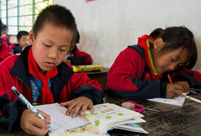Actions strengthened by authorities at provincial level in national crackdown
Provincial governments have beefed up anti-graft measures and punished officials at an increasing rate this year, amid a nationwide crackdown on corruption.
Since Spring Festival, 180 officials have been investigated for corruption in 22 of the Chinese mainland's 31 provinces, autonomous regions and municipalities.
In Guangdong province, at least 11 department-level officials have been investigated in the past two months alone. Thirty-eight department-level officials were investigated in the province during all of 2013.
Anti-corruption authorities in Hubei and Sichuan provinces have probed more than 20 department-level officials since early February.
Department-level officials rank higher than those in counties and townships but lower than officials at ministerial level.
Twenty-three ministerial-level officials have been investigated since November 2012, after the Communist Party of China elected its new leadership.
The latest probe of senior officials came on Saturday when Shen Weichen, Party chief and executive vice-president of the China Association for Science and Technology, was investigated for graft by the CPC Central Commission for Discipline Inspection, the county's top anti-corruption watchdog.
On April 1, the Hubei Provincial Party Commission for Discipline Inspection announced graft investigations of three department-level officials: Wang Hongqiang, vice-director of Yichang City People's Congress; Yu Xinguo, director of the Wuhan City Commission of Economy and Information; and Zhang Qinyun, general manager of Wuhan Daily Media Group.
Provincial anti-corruption authorities have rarely announced multiple investigations simultaneously.
On March 27, nine county-level officials in Hainan province were expelled from the Party and removed from their posts over corruption allegations including embezzlement and bribery.
On the same day, Ji Wenlin, former vice-governor of Hainan, was removed from office by the provincial people's congress. Ji had been the subject of a corruption probe since Feb 18.
To prevent corruption, many provincial anti-graft agencies have issued detailed rules governing official activities and behavior.
For example, if officials in Guangdong want to hold banquets for weddings, birthdays, funerals or their children's college enrollments, they must apply to the provincial anti-graft agency 10 days before the event, under a regulation issued by the local government on Tuesday.
In the applications, the officials are required to state why the banquet is being held and how many people will be invited.
The move is aimed at preventing officials from accepting bribes on the pretext of a personal celebration.
Li Jiuwu, a disciplinary official in Beijing's Huairou district, accepted 156,000 yuan ($25,000) in cash during his daughter's wedding in September. Li received a severe warning as punishment, according to the CPC Central Commission for Discipline Inspection.
Local governments' anti-graft efforts are mirroring the Central Commission for Discipline Inspection, which said in early January that anti-graft officials themselves will be punished if they fail to supervise officials effectively.
Ren Jianming, a professor of clean-governance studies at Beihang University, said provincial governments will be more active in fighting graft this year.
The top anti-graft agency also announced late last year that it will have the final say over the nomination and promotion of provincial-level disciplinary officials. As a result, those authorities will be more independent in probing local corruption, Ren said.
Hong Qiang, secretary of the Jiangsu Provincial Commission for Discipline Inspection, said that 10,357 local officials, including 13 at department level, were punished for corruption last year.
Local disciplinary officials were also urged to keep close watch over activities that easily lend themselves to corruption.
A total of 111 officials were punished last year for failing in their supervisory roles, Hong said on Wednesday.
 Wonderful moment of China's airborne forces
Wonderful moment of China's airborne forces Bai Baihe shoots for fashion magazine
Bai Baihe shoots for fashion magazine Red terraced fields in Dongchuan of Yunnan
Red terraced fields in Dongchuan of Yunnan Let's dance in harmonic Shaanxi
Let's dance in harmonic Shaanxi Jiaju Tibetan Village
Jiaju Tibetan Village Confucius institute at UC Davis
Confucius institute at UC Davis Little painted faces at temple fair
Little painted faces at temple fair Top 10 safest airlines in the world
Top 10 safest airlines in the world Foreign students at China-Myanmar border
Foreign students at China-Myanmar border The backstage of the Fashion Week
The backstage of the Fashion Week College students in Han costumes
College students in Han costumes Postgraduate works as waitress
Postgraduate works as waitress Life in a Lahu village in Yunnan
Life in a Lahu village in Yunnan An orphan’s wedding
An orphan’s wedding Hollywood documentary brings Diaoyu Islands truth to new audience
Hollywood documentary brings Diaoyu Islands truth to new audienceDay|Week|Month